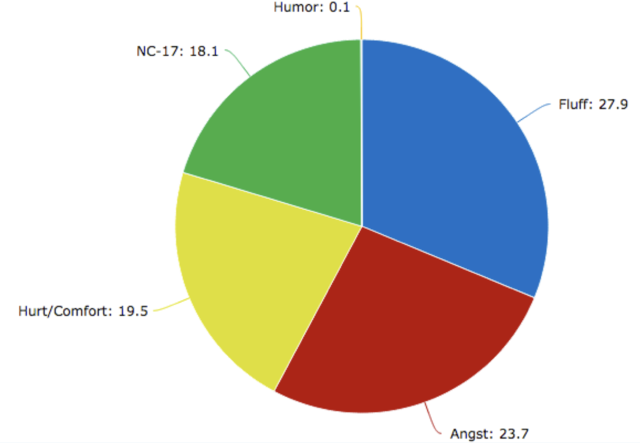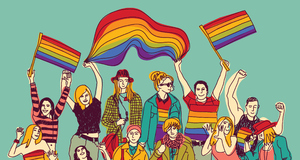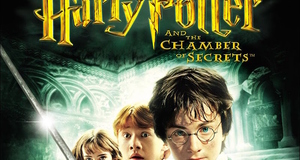|
Harry Potter is Gay: An Investigation of Queer Fan Culture
Many survey respondents discussed fearing fetishization of queerness from within the community, but not as much as they cited fearing backlash to their headcanons. One respondent Tia says, “My least favorite part is the part when I come offline and realize that it's not happy and warm out here as it is in there. Nobody shares the headcanons we share, our interpretations of characters. They are really cruel, and it always hurts to remember that.” Here it is clear that queer fan fiction is not only a way for people to see their own identities normalized and reflected back at them, but also a community that thrives off of one another and will always be there to remind others that they are not alone despite outside criticism.
In addition, many people are under the impression that queer fan fiction’s audience consists of heterosexual women merely interested in sexual situations involving male characters. However, as I already stated, 87% of my respondents were queer. Furthermore, many of them stated that overly graphic fan fictions make them uncomfortable: nearly 30% of respondents were asexual and most of them shared this sentiment, along with others who are not asexual who simply do not read NC-17 fan fictions because of their association of Harry Potter with childhood. Others prefer happier fan fiction because of Harry Potter plots’ tendency to end tragically. One survey respondent, Linsey March, points out people’s tendency to remark that fan fiction is about nothing but sex:
I tend to enjoy fluffy fan fictions, or one that builds upon character development with an interesting plot. I think most people perceive fan fiction as nothing more than smut, and while I enjoy NC-17 fan fictions, I prefer to read about the romance primarily. It feels like there's a Nicholas Sparks novel out every year that people pine over. There's no real equivalent for LGBTQ+ people, but fan fiction can satisfy that in a sense.
March also makes a great point about how fan fictions fulfill an enormous amount of people’s desire to read a happy, romantic ending, and queer people are no exception to that yearning. The market for romance novels grows alongside fan fiction. Both get a bad reputation – which is intricately linked with the perception that women exclusively enjoy happily-ever-afters that are not real literature – yet romance novels are at least more sellable because they are inundated with heterosexuality.
Preferred Fan Fiction Genres

In fact, it was a close race between various types of fan fiction. There are a ton of genres, but survey respondents mentioned six different distinct types of fan fiction they like to read. After 215 votes for various favorite fan fiction genres, the results came in as shown in the pie chart above. Here it is clear that NC-17 is not an overwhelmingly massive motive for people to indulge in fan fiction. Many respondents stated that they want fan fiction to mirror real life as much as possible, including the essence Rowling creates in the Harry Potter universe – which may include sexual scenes but does not focus on them. Of the thirty-nine people who voted NC-17 as one of their favorite types of fan fiction, only three people listed PWP as the only type of fan fiction they gravitate toward.
Several respondents mentioned specific fan fictions that fit the popular requirement of having elements of hurt/comfort, fluff, NC-17, and angst. Striking an even balance of these elements can take a good fan fiction to almost cult level, and it is no surprise that survey respondents mostly mentioned Drarry and Wolfstar fan fictions. One of those is “The Shoebox Project,” the aforementioned fan fiction that parents read to children and that many think of as Wolfstar canon. Although The Shoebox Project is known to many for its humorous dialogue, one scene in particular that reaches out to fans is the funeral scene for the parents of James Potter, during which Remus, through comforting an angry Sirius, realizes it’s time for them to be more than friends:
Remus has thought about it often enough before. Not holding Sirius, not that, but rather the awkwardness of holding anyone, the way he doesn't know when to tighten his grip or let go. The possibility of bumping heads. The odds of catching someone else's hair on his buttons. The chances someone will smell something on him, last night's dinner or toothpaste or old sweater, that's somehow disagreeable or even loathsome. How easy it is to miscalculate someone's height. How easy it is to knock chins, elbows, noses. Remus has thought about it a lot of the time. He cringes at the idea of physical proximity and the heightened awareness it brings of his own physical ineptitude. He even thinks about it now in a vague and almost funny way as he realizes that when someone needs that closeness as much as you do it doesn't matter for shite if he can do it or if he can't. It's just the holding that counts. It's just the holding they'll remember.
“Sirius,” he says.
Suddenly his own hands are everywhere, and because he's stopped thinking, and can't stop feeling, he knows exactly what to do. Like instinct. Like lifting up his head and howling at the full moon. Like tearing his tendons into taffy. It's all pain and nature: like that. He gets his fingers in Sirius' hair, and holds him at the base of his skull with the curve of his palm. He's known but not known exactly for some time now that he's bigger than Sirius is, though Sirius isn’t small. It's funny to him to hold that difference in his arms. Really, truly ridiculous. (Part 22, 15-16)
This scene represents Remus coming to terms not only with himself as an adult amidst war, but as someone who’s matched as a lover for Sirius. The moments in queer fan fiction that tend to speak to readers the most are usually full of emotion and often deal with growing up, realizing they are queer, or that they are in love with someone. Another popular fan fiction that many respondents cited is “Reparations” by Saras_Girl:
“Enough. I’ve had enough of this now, Draco.” Harry pushes off the shelves and stands straight, arms folded, looking down at Draco in his desk chair. “Who exactly do you think you are, with your flirting and grabbing and kissing in cupboards, and then your sudden meetings and appointments and anything else that you can fucking think of to keep me at arm's length? What's your fuckingproblem?”
Slightly breathless, Harry falls silent. The grey eyes smoulder dangerously for a moment before Draco drops his gaze to the desk again. Picks up the quill and grips it just a little bit too hard.
“Can you hear yourself?” he says evenly. “You're incoherent.”
“My articulacy is not what we're discussing here and you know it!” Harry explodes.
“We aren't discussing anything, Potter. You're yelling at me. In my office, I might add. You should also know that I'm trying to fill in your evaluation.”
“Potter, is it now?”Again. Harry sighs, staring at the side of the blond head. “For fuck's sake, Draco. Retreating back to cold formality because you're... whatever you are. Scared, I reckon.”
“I am not scared,” Draco refutes. “I'm certainly not scared of you, if that's what you're implying.”
“No, would you please just... Merlin... confront this thing. You were there, too, as I remember.” (Chapter 8)
This scene is a pivotal moment in “Reparations,” when Harry confronts Draco after they kiss and Draco subsequently ignores Harry. They work at the wizard hospital St. Mungo’s together, so Harry storms in and demands that Draco admit what happened and stop ignoring him. This is a notable moment because it’s when Saras_Girl’s Harry starts fighting to get what he wants – in this case, Draco – and it also has that realism factor that fan fiction readers admire. In addition, this Harry is similar to Rowling’s Harry in the sense that they are both stubborn and relentless when they realize someone is treating them unfairly and that the situation could easily improve.
The reason behind fans viewing certain characters as queer or not varies greatly. Sometimes it depends on a character’s circumstances that read like a coming out narrative such as Harry finding out he’s a wizard, or it can be parallels between rejecting one’s close-minded family and breaking social norms such as Sirius Black does. However, many survey respondents cited having no reason for their queer headcanons, and furthermore, stated they needed no reason. Others claimed that they headcanon nearly every character as queer, and this may be where some people stop listening. However, it’s important to recognize that many fans headcanon characters as queer without shipping them, as can be seen in the pie chart below.
In “Homosexuality at the Online Hogwarts,” Catherine Tosenberger mentions that with Kirk/Spock as the origin of slash, many did not view these characters as necessarily queer just because they enjoyed viewing them in same-gender relationships. This viewing of characters in same-gender relationships does not often threaten fans – mostly heterosexual – who do not ship these characters in queer relationships, because it is easy to say “I don’t ship that” and leave it at that. But queer fans are in fact participating in a transgressive act when they state their favorite characters are queer by themselves: it is harder to shut down these headcanons because they are intricately personal, and therefore the sixteen survey respondents who said they headcanon everyone as queer certainly would disrupt the unquestioning way that many read Harry Potter. In part due to the lack of clear-cut information regarding character’s sexuality and gender identities – not to mention race – it is inspiring that fans who are consistently marginalized by media see themselves in stories and stand behind those interpretations. This rejects the message that society too often puts forth that people are straight until proven gay, and by extension, that there must be specific traits – whether due to personality or physicality – that prove that someone is queer.
But we can’t see ourselves in our favorite stories without realizing that many of these works do not actually provide us with queer representation. Many survey respondents mentioned that their involvement in the queer Harry Potter fan fiction community made them more critical of their favorite stories. It is fine to be a fan of narratives despite their problematic elements; it is the acknowledgement of these potentially harmful elements that makes one a dedicated, responsible fan. One anonymous survey respondent wrote, “It was more Harry Potter criticisms that really lead me towards an interest in the topic of representation.” Another, Kiwi, wrote, “It helped me develop a critical eye for the portrayal of characters and for plot development. I learned from my corner of HP fandom how to look at Harry Potter itself with a critical eye but also to cherish this unique world we were given and the characters we love to play around with.”
Certain fans may look down on others who ship characters in a queer relationship or headcanon them as queer. Some fans view these headcanons and ships as a blatant disregard for J.K. Rowling’s work, implying that queer fans do not respect the text and become angry for no reason regarding this issue. However, casting a critical eye on one’s favorite text does not mean that you are disrespecting it; in fact, in this case it takes on the exact opposite meaning. If queer fans didn’t care enough about Harry Potter, they wouldn’t go out of their way to creature and nurture headcanons and countless stories. Also, fan fiction not only inspires fans to think critically about texts, but also social issues, as tumblr user forestofmyown states: “I have come out of it all as an educated feminist, and it’s had such a major impact on my life I can’t even express it.”
In addition, fan fiction is often fodder for writers to grow into themselves and pen diverse, rich characters. Jaida Jones, one of two authors of “The Shoebox Project,” is now – along with her wife – the author of the fantasy series Havemercy featuring gay wizards and dragons. Also notable is Rainbow Rowell, contemporary New York Times Bestselling author of the young adult books Eleanor and Park and Fangirl. Rowell began writing through Harry Potter fan fiction, stating that she felt depressed between book releases. She has no qualms admitting that she wrote a 30,000-word Drarry fan fiction: “It’s Harry and Draco as a couple who have been married for many years, and they’re raising Harry’s kids… It’s them dealing with attachment parenting and step-parents and all these middle-aged issues” (Shaffi). Rowell’s novel Fangirl revolves around a teenage girl who is a super fan of what is essentially the novel’s equivalent of Harry Potter, and writing fan fiction is her number one hobby. Rowell also openly recommends Drarry fan fictions to fans and has also shared photos on Twitter of her office around which she tapes fan art for her books. Some are shocked to liken the phenomenon of fan fiction to published authors, but many had their start in fan fiction and, after all, writers read, and their favorite stories will never cease to inspire their own works.
Queer fan works impact queer readers’ experience with Harry Potter by cultivating a community in which they can express their sexual and gender identities and relate to others who feel the same way in this supportive environment that further bonds them with the text. Through the immense popularity of fan fiction and the overwhelming supportive nature of the responses to my survey, it is clear that there is a huge audience for queer stories. It is time for us to stop being marginalized. Queer fans find themselves in text where they are not explicitly present, and although this is important because it is unduly inspiring, people need exposure to queer works for many reasons. This issue is also important because queer fan works of our generation’s biggest literary phenomenon take front and center stage. They’re not exactly underground, and the fact that people even know these fan works exist and that there may be another side to their favorite characters impacts readers’ experience.
To revisit Ika Willis’s statement about creating gaps in the text, I argue that it is vital to consider the importance of creating gaps in which to fill the space with the queer Harry Potter fan fiction community. Many survey respondents mentioned making friends through queer fan fiction and feeling like they truly belong with the like-minded fans they found. Here are some quotes from fans about the importance of this community feel:
[My favorite part is] the feeling of community, seeing how this art is so much more important to LGBTQ people (because we are so hungry for positive images of ourselves in stories) and how heartfelt people appreciate it; worst part: knowing that we don't deserve representation and this feeling according to mainstream media and the general population, that we have to make our own stories because we are not wanted in the 'real' media.” (formerlyknownas-delight)
I enjoy consuming and creating these works because it's a smaller, closer community and you can really find what you want. Also you meet some amazing people along the way. (Anonymous)
At the end of the day, it makes me feel good though that there is a community out there doing these incredible fan works. Makes me feel a part of something bigger, even if I'm just a watcher. (Nat)
My favourite part is just the shared sense of community and the instant where people realise that they wanted to imagine a certain character a certain way, and everyone just shares experiences. (Adrian)
It’s all about visibility and the importance of representation – feeling that you’re part of a community is huge… I think that the presence of these ideas in my world has done a lot to help me get over the shame/fear/negative feelings that I’ve attached to my sexual and gender identities over the years. (Julia)
Not only is this attention to others within the queer Harry Potter fan fiction community crucial to forming bonds with queer people along with characters we headcanon as queer, but it is also important because in this case, personal experience is research that proves the significance of these works. That these people take part in such a nurturing, ever-growing community – which is made more personal by the fact that 23.2% of respondents found queer Harry Potter fan fiction through a friend or family referral – encourages them to continue creating transformative queer works.
Queer Harry Potter fan works are certainly not the fullest extent of queer representation, but they create a unique sense of bonding, one that I experienced merely from pulling survey results and writing this essay. The sentiment these respondents added, wishing me luck in my endeavor to discover the real draw toward queer Harry Potter fan works, was overwhelmingly supportive. Queer Harry Potter fan works are necessary because of their striving to change fiction: many thanked me for my devotion to this project and stated that they had never heard of this topic in an academic setting. However, there is no reason for this not to necessitate serious discussion. The message that queer Harry Potter fan works and survey respondents present is a resounding echo of, “you are not alone,” and this is proof that queer representation impacts people in a very real, visceral way.
Gilesbie, Tara. "My Immortal Reuploaded, a Harry Potter Fanfic | FanFiction." FanFiction.net, 2006. Web. 05 Dec. 2014.
“History of AIDS Up to 1986.”HIV and AIDS Information and Resources. N.p., n.d. Web. 23 Nov. 2014. .
Jurgensen, John. “Rewriting the Rules of Fiction.” The Wall Street Journal. Dow Jones & Company, 16 Sept. 2006. Web. 10 Nov. 2014.
LadyJaida and dorkorific. “Part Twenty Two: April, 1977.” (n.d.): 15-16.The Shoebox Project. Lomara, Feb. 2011. Web. 28 Nov. 2014.
Lynch, Deidre. “On Going Steady with Novels.” The Eighteenth Century. 50.2-3 (2009): 207-19. Web. 13 Oct. 2014.
Pugh, Sheenagh. The Democratic Genre: Fan Fiction in a Literary Context. Bridgend: Seren, 2005. Print.
Rowling, J.K. “Pottermore: A Unique Online Harry Potter Experience from J.K. Rowling.”Pottermore: A Unique Online Harry Potter Experience from J.K. Rowling. N.p., July 2013. Web. 24 Nov. 2014.
Russ, Joanna. “Pornography by Women for Women, with Love.” The Fan Fiction Studies Reader. By Karen Hellekson and Kristina Busse. N.p.: n.p., n.d. 82-96. Print.
Saras_Girl. “Reparations, Chapter 8.”Archive of Our Own. N.p., 11 July 2011. Web. 28 Nov. 2014.
Shaffi, Sarah. “Rainbow Rowell Speaks out on Writing Harry Potter Fan Fiction.” The Bookseller, 16 July 2014. Web. 05 Dec. 2014.
Swain, Vondell. “Vondell Swain: Itsvondell: My HP Headcanons All Have And...”Vondellswain.tumblr.com. Tumblr, Mar. 2014. Web. 04 Dec. 2014.
The Scarlet Woman. “Supernatural and Queer Love: Destiel, Queer Baiting, and Homophobia.”Supernatural and Queer Love: Destiel, Queer...Tumblr, 2 July 2013. Web. 25 Nov. 2014.
Tosenberger, Catherine. “Homosexuality at the Online Hogwarts: Harry Potter Slash Fanfiction.”Children's Literature36 (2008): 185,207,273.ProQuest.Web. 13 Oct. 2014.
Upton, Sue. Video Interview with David Thewlis on Dumbledore Revelation and More. The Leaky Cauldron, 25 Oct. 2007. Web. 14 Nov. 2014.
- Though some non-heterosexual and/or non-cisgender (cisgender meaning not transgender) people consider “queer” a slur, I use “queer” here, as “LGBTQ” does not account for many different identities.
- “Alternate Universe” refers to fan works dealing with the question of what might happen to a certain character or plotline if it existed in another world or happened differently.
- Names written with a slash in between them indicates that this is a ship.
- “Slash” refers to any homosexual or homoerotic pairing.
- “Ship” is short for relationship.
- Hurt-comfort is a genre of fan fiction that focuses on nurturance in the face of hardship.
- “Canon” refers to what is visibly present in the text.
- I wrote an EP about My Immortal called “Fangz 2 Raven.” Feel free to Google it.
- In this fan fiction, Harry’s new name is “Vampire Potter” because he’s gothic and a vampire.
- The Marauders’ era is the time period during which Harry Potter’s parents attended Hogwarts School of Witchcraft and Wizardry.
- “Pre-slash” is a term for the period of the story in which there is no explicit homosexual relationship present, but there will be eventually.
- 54.2% of respondents identified as cisgender women, .09% nonbinary, .09% genderqueer, .07% agender, .06% genderfluid, .03% cisgender men, .02% demigirl, .02% transgender men, and .006% bigender.
- 28.4% of respondents were asexual, 25.9% bisexual, 12.9% were heterosexual, 11.1% pansexual, .09% queer, .05% lesbian, .03% gay, .02% questioning, and .006% polysexual.
- The ship of Remus/Sirius is nicknamed “Wolfstar” because Remus is a werewolf and Sirius is the name of Canis Major, the Dog Star.
- Initiated in 2002 by the band Harry and the Potters, wizard rock is music that people write about Harry Potter. We tour and sell CDs and have wizard rock-specific conventions. Hi, I’m Tianna and the Cliffhangers.
- Sirius Black came in second place, with 62% of respondents viewing him as queer.
- Heteronormativity is the promotion of heterosexuality as normal, natural, and the only way to exist.
- MOGII stands for Marginalized Orientations, Gender Identities, and Intersex.
- Headcanons are beliefs about characters or plotlines that may or may not correlate with canon.
- Twelve survey respondents pointed out that their least favorite aspect of being in the queer Harry Potter fan fiction community is fetishization, which refers to dehumanizing characters by restricting them to their sexualities.
- “Fluff” is a genre of fan fiction that is usually happy, romantic, and light-hearted.
- “White People Almost Kissing” was coined in 2012 when reddit user brigitteteleu uploaded the above photo, captioned, “White People Almost Kissing, a book by Nicholas Sparks.” This phenomenon not only makes for a good laugh, but also is worth pointing out because of the abundance of heterosexuality and whiteness in mainstream romance novels.
- PWP stands for “plot? what plot?” and most often refers to stories that consist of porn. It can also stand for “porn without plot.”
- The “other” characters respondents mentioned are Pansy Parkinson, Marietta Edgecombe, Cedric Diggory, Amelia Bones, Cho Chang, Crabbe, Goyle, Lavender Brown, Fred, Bill, George, Percy and Ron Weasley, James and Lily Potter, Lee Jordan, Scorpius and Lucius Malfoy, Regulus Black, Barty Crouch Jr., Alastor Moody, Dumbledore, Madam Pomfrey, James Sirius and Albus Severus Potter, Blaise Zabini, Romilda Vane, Professors Flitwick, Snape, Sprout, McGonagall, Hooch, and Grubbly-Plank, Colin Creevey, Grindelwald, Bellatrix Lestrange, Filch, Voldemort, Neville Longbottom, Padma and Parvati Patil, Teddy Lupin, Lysander Scamander, Dominique and Victoire Weasley, Fleur Delacour, Hagrid, Madame Maxime, and Oliver Wood.
- Blogger Vondell Swain sells buttons online featuring a mixed race Harry Potter, stating, “I’ve generally operated on a POC-unless-otherwise-noted basis with how I imagine characters. My HP headcanons aren’t What If Everybody In Harry Potter Was Black Instead Of White. They only read that way if you’re still stuck in the white-as-default zone... Squeeze representation out of anywhere you can feel it and fabricate the rest. Own your fiction.”
- The fan fiction website ArchiveOfOurOwn.org boasts 64,679 Harry Potter fan fictions to date while the popular FanFiction.net contains roughly 696,000. However, these are only two of many websites to which fan fiction is uploaded.
- I met Rainbow Rowell at a library in Arlington, Virginia this September and she recommended me her favorite Drarry fan fiction author (the username is “lettered” on ArchiveOfOurOwn).
Gilesbie, Tara. "My Immortal Reuploaded, a Harry Potter Fanfic | FanFiction." FanFiction.net, 2006. Web. 05 Dec. 2014.
“History of AIDS Up to 1986.”HIV and AIDS Information and Resources. N.p., n.d. Web. 23 Nov. 2014. .
Jurgensen, John. “Rewriting the Rules of Fiction.” The Wall Street Journal. Dow Jones & Company, 16 Sept. 2006. Web. 10 Nov. 2014.
LadyJaida and dorkorific. “Part Twenty Two: April, 1977.” (n.d.): 15-16.The Shoebox Project. Lomara, Feb. 2011. Web. 28 Nov. 2014.
Lynch, Deidre. “On Going Steady with Novels.” The Eighteenth Century. 50.2-3 (2009): 207-19. Web. 13 Oct. 2014.
Pugh, Sheenagh. The Democratic Genre: Fan Fiction in a Literary Context. Bridgend: Seren, 2005. Print.
Rowling, J.K. “Pottermore: A Unique Online Harry Potter Experience from J.K. Rowling.”Pottermore: A Unique Online Harry Potter Experience from J.K. Rowling. N.p., July 2013. Web. 24 Nov. 2014.
Russ, Joanna. “Pornography by Women for Women, with Love.” The Fan Fiction Studies Reader. By Karen Hellekson and Kristina Busse. N.p.: n.p., n.d. 82-96. Print.
Saras_Girl. “Reparations, Chapter 8.”Archive of Our Own. N.p., 11 July 2011. Web. 28 Nov. 2014.
Shaffi, Sarah. “Rainbow Rowell Speaks out on Writing Harry Potter Fan Fiction.” The Bookseller, 16 July 2014. Web. 05 Dec. 2014.
Swain, Vondell. “Vondell Swain: Itsvondell: My HP Headcanons All Have And...”Vondellswain.tumblr.com. Tumblr, Mar. 2014. Web. 04 Dec. 2014.
The Scarlet Woman. “Supernatural and Queer Love: Destiel, Queer Baiting, and Homophobia.”Supernatural and Queer Love: Destiel, Queer...Tumblr, 2 July 2013. Web. 25 Nov. 2014.
Tosenberger, Catherine. “Homosexuality at the Online Hogwarts: Harry Potter Slash Fanfiction.”Children's Literature36 (2008): 185,207,273.ProQuest.Web. 13 Oct. 2014.
Upton, Sue. Video Interview with David Thewlis on Dumbledore Revelation and More. The Leaky Cauldron, 25 Oct. 2007. Web. 14 Nov. 2014.
Endnotes
- Though some non-heterosexual and/or non-cisgender (cisgender meaning not transgender) people consider “queer” a slur, I use “queer” here, as “LGBTQ” does not account for many different identities.
- “Alternate Universe” refers to fan works dealing with the question of what might happen to a certain character or plotline if it existed in another world or happened differently.
- Names written with a slash in between them indicates that this is a ship.
- “Slash” refers to any homosexual or homoerotic pairing.
- “Ship” is short for relationship.
- Hurt-comfort is a genre of fan fiction that focuses on nurturance in the face of hardship.
- “Canon” refers to what is visibly present in the text.
- I wrote an EP about My Immortal called “Fangz 2 Raven.” Feel free to Google it.
- In this fan fiction, Harry’s new name is “Vampire Potter” because he’s gothic and a vampire.
- The Marauders’ era is the time period during which Harry Potter’s parents attended Hogwarts School of Witchcraft and Wizardry.
- “Pre-slash” is a term for the period of the story in which there is no explicit homosexual relationship present, but there will be eventually.
- 54.2% of respondents identified as cisgender women, .09% nonbinary, .09% genderqueer, .07% agender, .06% genderfluid, .03% cisgender men, .02% demigirl, .02% transgender men, and .006% bigender.
- 28.4% of respondents were asexual, 25.9% bisexual, 12.9% were heterosexual, 11.1% pansexual, .09% queer, .05% lesbian, .03% gay, .02% questioning, and .006% polysexual.
- The ship of Remus/Sirius is nicknamed “Wolfstar” because Remus is a werewolf and Sirius is the name of Canis Major, the Dog Star.
- Initiated in 2002 by the band Harry and the Potters, wizard rock is music that people write about Harry Potter. We tour and sell CDs and have wizard rock-specific conventions. Hi, I’m Tianna and the Cliffhangers.
- Sirius Black came in second place, with 62% of respondents viewing him as queer.
- Heteronormativity is the promotion of heterosexuality as normal, natural, and the only way to exist.
- MOGII stands for Marginalized Orientations, Gender Identities, and Intersex.
- Headcanons are beliefs about characters or plotlines that may or may not correlate with canon.
- Twelve survey respondents pointed out that their least favorite aspect of being in the queer Harry Potter fan fiction community is fetishization, which refers to dehumanizing characters by restricting them to their sexualities.
- “Fluff” is a genre of fan fiction that is usually happy, romantic, and light-hearted.
- “White People Almost Kissing” was coined in 2012 when reddit user brigitteteleu uploaded the above photo, captioned, “White People Almost Kissing, a book by Nicholas Sparks.” This phenomenon not only makes for a good laugh, but also is worth pointing out because of the abundance of heterosexuality and whiteness in mainstream romance novels.
- PWP stands for “plot? what plot?” and most often refers to stories that consist of porn. It can also stand for “porn without plot.”
- The “other” characters respondents mentioned are Pansy Parkinson, Marietta Edgecombe, Cedric Diggory, Amelia Bones, Cho Chang, Crabbe, Goyle, Lavender Brown, Fred, Bill, George, Percy and Ron Weasley, James and Lily Potter, Lee Jordan, Scorpius and Lucius Malfoy, Regulus Black, Barty Crouch Jr., Alastor Moody, Dumbledore, Madam Pomfrey, James Sirius and Albus Severus Potter, Blaise Zabini, Romilda Vane, Professors Flitwick, Snape, Sprout, McGonagall, Hooch, and Grubbly-Plank, Colin Creevey, Grindelwald, Bellatrix Lestrange, Filch, Voldemort, Neville Longbottom, Padma and Parvati Patil, Teddy Lupin, Lysander Scamander, Dominique and Victoire Weasley, Fleur Delacour, Hagrid, Madame Maxime, and Oliver Wood.
- Blogger Vondell Swain sells buttons online featuring a mixed race Harry Potter, stating, “I’ve generally operated on a POC-unless-otherwise-noted basis with how I imagine characters. My HP headcanons aren’t What If Everybody In Harry Potter Was Black Instead Of White. They only read that way if you’re still stuck in the white-as-default zone... Squeeze representation out of anywhere you can feel it and fabricate the rest. Own your fiction.”
- The fan fiction website ArchiveOfOurOwn.org boasts 64,679 Harry Potter fan fictions to date while the popular FanFiction.net contains roughly 696,000. However, these are only two of many websites to which fan fiction is uploaded.
- I met Rainbow Rowell at a library in Arlington, Virginia this September and she recommended me her favorite Drarry fan fiction author (the username is “lettered” on ArchiveOfOurOwn).
Suggested Reading from Inquiries Journal
The transition to adulthood in the lives of non-heterosexual youth may offer rich information regarding the criteria youth utilize to measure their achievement of adult status. Yet LGBQ youth experiences and the transition to adulthood have not been brought together in formalized research. This study is based on a small number of... MORE»
“Beware: Capitalist-Consumerism poses a danger to our Socialist ideals,” the Soviet-propaganda papers such as Pravdaand Izvestyahad proclaimed since the harrowing days of the Cold War. But by the early 1990s, the evergreen motto of the USSR, “We have everything,” had been supplanted... MORE»
When one analyzes recent LGBTQ advocacy, with its rhetoric of liberal normativity and visibility, the gay rights movement has chosen inclusion over revolution. Through the intersectionality of dominant forms, namely whiteness, patriarchy, and affluent consumerism, these series of political moments constitute homonormativity. While... MORE»
By and large, today’s Western audience is unlikely to be roused by the story told in The Danish Girl (2015, directed by Tom Hooper), although it is based on true events. The artist Einar Wegener is in gender trouble:[1] he was born in a male body, yet finds himself in the position of being unable... MORE»
Latest in Sociology
2022, Vol. 14 No. 02
Numerous studies have investigated why women are vastly underrepresented in prisons across the United States. In explaining this “gender gap,” scholars have found that women are treated more leniently than men at various stages of the... Read Article »
2021, Vol. 13 No. 05
This paper draws on qualitative interviews to address internal and external identity navigation among gang members and how nonprofits address this navigation. Gang members ultimately lead double lives as they weave between gang and community life... Read Article »
2021, Vol. 13 No. 02
Motherhood is an essential yet challenging feat that requires constant emotional, social, and physical support. Postpartum depression (PPD) is a devastating illness that has detrimental effects on both the mother and her child. PPD is a growing... Read Article »
2021, Vol. 13 No. 02
This paper will attempt to link fundamental ideas and terms of environmental sociology in the context of ecotourism relating to human society and conceptions of nature. Furthermore, connections to neo-Marxist and neo-Gramscian theories will be made... Read Article »
2021, Vol. 13 No. 01
The number of Americans aged 65-years-and-older is projected to increase significantly by 2050. As rural older adults age-in-place, it is imperative to examine the links between cultural competencies, ethnic minority status, and access to care.... Read Article »
2020, Vol. 12 No. 11
The practice of using an English name is widespread among native Chinese speakers. Especially in Hong Kong many use an English name in their everyday life. Using qualitative interviews, this study examines the thoughts and feelings about this practice... Read Article »
2020, Vol. 12 No. 10
Colorism or skin tone bias is a form of discrimination based on skin tone that typically awards advantages to light-skinned people while penalizing dark-skinned people within an ethnic group. There is very little research on colorism in higher education... Read Article »
|




















